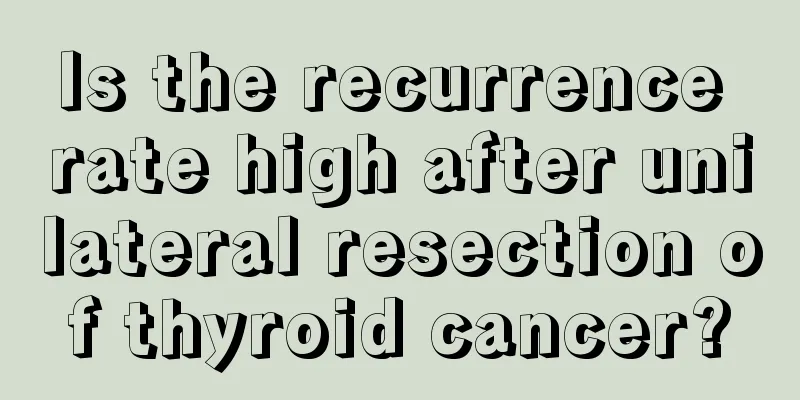What are the treatments for esophageal cancer?

|
Esophageal cancer, also known as esophageal cancer, is a malignant tumor that occurs in the esophageal epithelial tissue, accounting for 2% of all malignant tumors. About 220,000 people die from esophageal cancer every year in the world. my country is a high-incidence area for esophageal cancer, and the number of deaths from esophageal cancer ranks second only to gastric cancer. Most people are over 40 years old, and there are more men than women. However, in recent years, there has been an increasing trend in the number of people under 40 years old. So let's learn about the treatment methods of esophageal cancer. The proliferation cycle of normal esophageal epithelial cells is the longest in the human digestive tract. It takes about 1 to 2 years for esophageal basal cells to change from severe hyperplasia to cancer. It usually takes 2 to 3 years, or even longer, for early esophageal cancer (cancer cells are found in cytological examination, but X-ray esophageal mucosal angiography is normal or only has mild lesions) to become advanced invasive cancer. Some cases can even "live with cancer" for more than 6 years. Therefore, the early treatment of esophageal cancer is effective. Even if you fall ill in the late stage, if you treat it properly, you can turn for the better. Generally, surgical treatment is suitable for earlier lesions; for later lesions, and those who are located in the middle and upper segments and are young and tall or have contraindications to surgery, radiotherapy is preferred. (I) Surgical treatment: Surgery is the first choice for the treatment of esophageal cancer. The surgical resection rate of lower segment cancer is 90%, that of middle segment cancer is 50%, and that of upper segment cancer is 56.3% to 92.9% on average. Contraindications for surgery are: ① Clinical X-ray and other examinations confirm that the esophageal lesions are extensive and involve adjacent organs, such as the trachea, lungs, mediastinum, aorta, etc. ② Patients with severe cardiopulmonary or liver and kidney dysfunction or cachexia who cannot tolerate surgery. Except for the above situations, once the diagnosis is confirmed and the physical condition allows, surgical treatment should be taken. In addition, according to the condition, it can be divided into palliative surgery and radical surgery. Palliative surgery is mainly for patients in the late stage who cannot be cured or after radiotherapy. In order to solve the problem of eating difficulties, esophagogastric diversion, gastrostomy, esophageal catheterization, etc. are used. Radical surgery depends on the site of the lesion and the specific situation of the patient. In principle, most of the esophagus should be removed, and the range of esophageal resection should be at least 5 cm away from the tumor. (II) Radiotherapy: Radiotherapy for esophageal cancer includes two categories: radical and palliative. Surgery for cervical and upper thoracic esophageal cancer is highly traumatic and has a high incidence of complications, while radiotherapy is less damaging and has better efficacy than surgery, so radiotherapy should be the first choice. Patients with good general condition, who can eat semi-liquid or liquid food smoothly, who have thoracic esophageal cancer but no supraclavicular lymph node metastasis or distant metastasis, no tracheal invasion, no signs of esophageal perforation and bleeding, and whose lesion length is less than 7-8cm and who have no medical contraindications, can all receive radical radiotherapy. Other patients can receive palliative radiotherapy aimed at relieving esophageal obstruction, improving eating difficulties, alleviating pain, improving the patient's quality of life, and prolonging the patient's survival. 3. Drug treatment 1. Chemotherapy The cell proliferation cycle of esophageal cancer is about 7 days, which is slightly longer than that of normal esophageal epithelial cells. Theoretically, its doubling time is about 10 days, so there are fewer proliferative cells and more non-proliferative cells. Therefore, although there are many chemical drugs used for this disease, there are not many that are really effective. The remission rate of single-drug chemotherapy is 15% to 20%, and the remission period is 1 to 4 months. Most combined chemotherapy uses a combined chemotherapy regimen based on DDP and BLM, and the efficacy is mostly more than 30%, with a remission period of about 6 months. Combined chemotherapy is not only used for advanced esophageal cancer, but also for comprehensive treatment with surgery and radiotherapy. Currently, commonly used combined chemotherapy regimens in clinical practice include DDP-BLM, BLM-ADM, DDP-VDS-BML, and DDP-ADM-5-FU. Clinical observations show that chemotherapy drugs such as DDP, 5-FU and BLM have radiosensitization effects. In the past 10 years, such chemotherapy drugs have been used as sensitizers in combination with radiotherapy to treat esophageal cancer, and have achieved encouraging results. 2. Traditional Chinese medicine treatment currently adopts the main prescription plus syndrome differentiation and treatment, combining strengthening the body with promoting blood circulation and removing blood stasis. In North my country, Rubescens and Rubescensin are used. Experiments have shown that they have obvious cytotoxic effects on human esophageal squamous cell carcinoma cell line caes-17 and have a protective effect on a variety of animal transplanted tumors. Clinical applications have also shown that they have certain therapeutic effects. The above is the treatment method for esophageal cancer. Expert Tips: If you have symptoms of disease, do not delay diagnosis and go to a regular hospital for treatment in time to avoid delaying the disease and causing serious consequences. If you have other questions, please consult our online experts or call for consultation. I wish you health and happiness! Esophageal cancer http://www..com.cn/zhongliu/sda/ |
<<: What are the clinical symptoms of advanced esophageal cancer?
>>: What are the early symptoms of liver cancer?
Recommend
What is the early stage of heart disease
We all know that heart disease is a common circul...
What are the early symptoms of rectal cancer
Rectal cancer is a common tumor disease that occu...
How to make yellow shoes white
In order to have a good image, our dressing is al...
How long after intercourse can I take a pregnancy test?
Many couples are eager to have children and will ...
Can stomach cancer be prevented? Pay attention to these four points
Gastric cancer can be prevented. People should pa...
What fruits are good for patients with advanced kidney cancer?
No matter what disease you are treating, it is ve...
Does peanut butter make you fat?
Eating peanut butter will make you fat. The main ...
Is glutamyl transferase 120 a sign of liver cancer? Introducing several diagnostic methods for liver cancer
Glutamyl transferase 120 cannot be diagnosed as l...
What is the best time to do back-to-wall exercise?
People usually do various kinds of exercises. In ...
Is it possible to heal rectal cancer in late stage through exercise?
The incidence of rectal cancer has been on the ri...
What are the three major diagnostic methods for ovarian cancer?
What are the three major diagnostic methods for o...
The pros and cons of cosmetic dental crowns
Cosmetic crowns are a type of dental beauty techn...
Can kidney deficiency cause cervical spondylosis?
Kidney deficiency will not cause cervical spondyl...
There are many benefits to cutting nails frequently
Most gynecological diseases are preventable. As l...
Success rate of heart valve replacement surgery
Today's medical technology is relatively adva...









